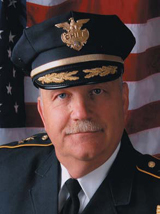 The IACP was founded 112 years ago by police chiefs who realized that fulfilling their duty required that they work together, that they share information, and that they communicate with each other. Even then, they realized that the criminals of their day were often on the move and that law enforcement agencies could no longer confine their efforts to a single jurisdiction, a single county, or a single state.
The IACP was founded 112 years ago by police chiefs who realized that fulfilling their duty required that they work together, that they share information, and that they communicate with each other. Even then, they realized that the criminals of their day were often on the move and that law enforcement agencies could no longer confine their efforts to a single jurisdiction, a single county, or a single state.
Through the efforts of these visionaries and their successors, the IACP has played a leading role over the years in ensuring that law enforcement agencies have kept pace with advances in transportation, communications, and technology and remain prepared to effectively combat crime in today’s highly mobile and fast-paced environment.
But it is clear that successfully confronting the challenge posed by transnational criminal and terrorist organizations requires that the international law enforcement community establish and maintain effective working relationships that allow us to pool our information and our resources. It is also clear that the IACP must continue to play a leading role in fostering the growth of these critical relationships.
That is why the IACP is so committed to enhancing our international programs and fostering communication among law enforcement executives worldwide. Throughout our history, the IACP has played a leading role in ensuring that law enforcement agencies around the world have kept pace with advances in transportation, communications, and technology and remain prepared to combat crime effectively in today’s highly mobile and fast-paced environment.
But we must do more. We must ensure that international criminals and terrorists are not able to evade justice because law enforcement agencies in different nations are unable to communicate, cooperate, or share critical information effectively.
It is for these reasons that the IACP Board of Officers developed and implemented a plan that will lead to a revitalized, restructured, and redirected international program at the IACP. The plan, which is focused on critical areas such as communication, affiliation, operations, and assistance, is designed to increase our international impact and presence and serve as a roadmap for the future growth of the IACP International Policing Division.
As a result of the implementation of this plan, the IACP has, over the last several years, held four regional conferences in Brazil and conferences in such places as Riga, Latvia; Belfast, Northern Ireland; Budapest, Hungary; Durban, South Africa; Mons, Belgium; New Delhi, India; and Ulannbator, Mongolia. Earlier this year, the IACP hosted its 22nd European Policing conference in Paris, France, and will host its Fifth South American Policing Conference in Foz do Iguacu, Brazil. In addition, the IACP has continued to raise our international profile by sending delegations to international policing conference such as the Istanbul Conference on Democracy and Global Security, the Dubai Middle East Police and Security Conference, the annual conference of the British Association of Chief Police Officers and the Association of Caribbean Commissioners of Police. More and more countries participate in these conferences each year.
In addition, we have restructured our International Division to include chief executive officer representation from various national and transnational organizations such as the Association of Caribbean Commissioners of Police; the Southern African Regional Police Chief Council Organization; the European Network of Police Women; the Association of Chiefs of Police (United Kingdom); the French National Police Association; the Superintendents Association of Northern Ireland; and the Organization for Security and Cooperation in Europe.
IACP’s international program is critically important to police executives around the world. We are aware that sharing ideas, investigative techniques, and specific crime-related information among agencies from different nations is the only way that we can succeed in our anticrime and antiterrorism efforts.
Despite differences in our languages, our cultures, and even the laws we enforce, we must all work together to prevail against our common enemies and fulfill our common mission. We cannot afford to fail in this effort. Criminals and terrorists are not bound by national boundaries, and therefore we must make every possible effort to establish effective working partnerships between police agencies and police executives throughout the world. I am pleased that through our international programs the IACP is doing its part to ensure that law enforcement agencies throughout the world are united to fight the forces of crime and terror.


